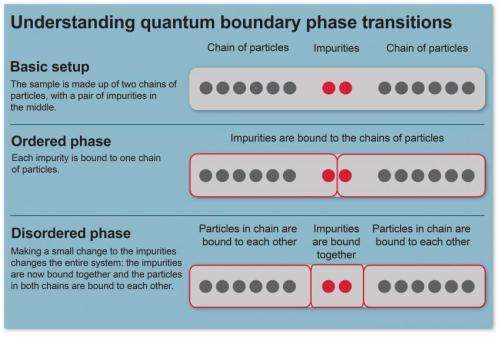Melting an entire iceberg with a hot poker: Spotting phase changes triggered by impurities

"What a curious feeling," says Alice in Lewis Carroll's tale, as she shrinks to a fraction of her size, and everything around her suddenly looks totally unfamiliar. Scientists too have to get used to these curious feelings when they examine matter on tiny scales and at low temperatures: all the behaviour we are used to seeing around us is turned on its head.
In research published today in the journal Nature Communications, UCL scientists have made a startling discovery about a familiar physical effect in this unfamiliar setting.
Phase transitions are a category of physical phenomena in which the properties of a sample and the relationships between the particles that make it up suddenly change. Phase transitions include familiar events such as water turning to ice when temperature drops, or a magnet losing its magnetisation when temperature rises.
On human scales, and at ambient temperatures, phase transitions are well understood. They are linked to the temperature (and hence the vibration, orientation and movement of particles) of an object. In quantum physics, however, phase transitions behave slightly differently, and can even occur close to absolute zero, when virtually no heat is present in a sample. These occur when a factor which affects the whole sample, such as a magnetic field, is changed. But in certain cases, quantum phase transitions can also happen when varying a highly localised factor, such as changing the coupling between a single pair of particles on the edge of such a system. These are called boundary phase transitions and would be like melting an entire iceberg by touching a corner of it with a hot poker.
Dr Abolfazl Bayat and Professor Sougato Bose (both UCL Physics & Astronomy), along with colleagues at other institutions, have probed the nature of boundary phase transitions in quantum systems. For the first time they have identified a measurable quantity that can label the distinct phases of such a system.
"When phase transitions happen, scientists often talk of an 'order parameter'," says Bayat. "This is the value which suddenly changes, such as the orientation of magnetisation in a metal, or the spacing of atoms in a sample which determines whether it is liquid or solid. Getting a handle on order parameters in quantum boundary phase transitions is much harder, but we have identified one in this research."
Bayat and Bose studied a system in which a tiny change applied to a single pair of impurities causes a change in the entire system. The two impurities can either be entangled with each other, or can separately be entangled with the left and right hand parts of the system. Changing the pairing of the impurities acts like a switch on the whole system, triggering a phase transition in the form of a sudden change in the entire sample.
"We found that that a quantity called the Schmidt gap has all the features of an order parameter for this phase transition," says Bose. "That means that mathematically it characterizes all the features of the phase transition in an analogous way to how magnetisation does for a magnet".
However, unlike magnetisation, which can be easily measured, the Schmidt gap is a non-localised quantity which requires every particle in a system to be individually measured. Although, this a challenging task, it is becoming viable in recent experiments in ultra-cold atoms.
This research opens up new possibilities for exploring phase transitions in quantum physics. In particular, where conventional methods which use localised order parameters are not applicable, this gives a new means of studying phase transitions. It may help to determine new phases of matter and shed light into the structure of complex systems.
Journal information: Nature Communications
Provided by University College London



















